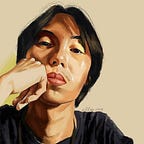Comics Review: Dirty Laundry and Other Stories 3 by danielle riña; Maybe: A Short Comic by Mikki Castro
While there has been critical criticism of local comics in the academe, one of the conversations I have yet to personally witness is the role and application of nonfiction in Filipino comics outside of Lynda Barry. Because a lot of local comics are independent, there is no systemic process for labeling and identifying such work. Instead, we have comics that are taken at face value, and it is up to the reader to decide which is real and which is fictionalized, without sidestepping the issue that regardless of how the narrative was presented, the story is true—at the very least for the author if not for the reader.
In many ways, Dirty Laundry and Other Stories 3 and Maybe: A Short Comic are opposites: the former is the third in the series, while the latter stands alone; danielle riña’s work is raw and literal, while Mikki Castro’s is deliberate and measured; one crams a lot into the page, while the other makes use of negative space. But one common link among both is how they feel personal and attempt to elicit an emotional response.
There is much to criticize about Dirty Laundry and Other Stories 3, yet this is also my favorite in the sense that it makes me relate and want to hug the author. The typography isn’t always legible, the art isn’t in a style I prefer, and the narration is didactic. But arguably, because of all those elements, and not in spite of it, the comic is charming right down to the white correction fluid on the cover. What makes it effective isn’t the narrative technique per se, but the brutally honest way in which riña narrates her experiences: it is a personal story, and she is sharing it with us, in confidence. By comparison, Maybe: A short Comic is neat and more refined, but this also creates a barrier between the reader and the author, as if instead of a beating bleeding heart, we instead get this sanitized and shrinkwrapped facsimile. There are glimpses of brilliance here—the Facebook status scene is one example—but for the most part, it feels like Castro is holding back. That’s not to say Maybe: A Short Comic doesn’t work; it’s competent and arguably superior in terms of art technique, but it also begs the question, what do we look for in a story, biographic or otherwise? What is our hierarchy when it comes to emotional investment? Style? Authenticity? If the authors approached us and told us neither story was real, would that deprive the comic of value?
While local comic creators are exploring various types of stories and concepts—usually in the space of fiction and fictionalized histories—Filipino comics has, over the years, exploring this space of autobiography, whether it’s anthropomorphized characters in Josel Nicolas’s Windmills, or one-page strips in Rob Cham’s Stories. They all take a different approach, especially in light of the works of danielle riña and Mikki Castro, and the direction it takes us will be an interesting dialog. Do we need to be informed that these comics are biographical? And how would it impact how we read them? Perhaps the weakness of this review is that it presumes that the comics are biographical, and it certainly is possible that they aren’t—and to what extent do we juggle what actually happened and what makes the most sense from a paradigm of narrative?
